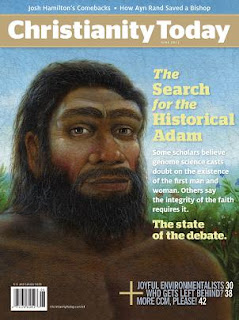Vance McAllister has done an excellent job of laying out the different positions in regard to evolution, creation, and biblical literalism. After reading his spectrum, head on over to Reclaiming the Mind Ministry’s Parchment and Pen blog and The Submerging Influence blog for additional discussion. Of course, feel free to discuss on this blog as well!
**********************************
Here is the spectrum generally, you can review the descriptions further below to see what each refers to:
1. FE
2. Geo
3. YEC
4. Gap (OEC)
5. Progressive (OEC)
6. TE1
7. TE2
8. TE3
(note: the Intelligent Design position could apply to any of these, other than possibly TE 3).
So, let’s look at the spectrum! See where you land:
1. Flat-earthers – believe that a plain reading of Scripture indicates that the earth is flat. Very few still hold onto this belief.
2. Geocentrists – believe that the sun and all the stars literally revolve around a fixed and unmoving earth. Still a surprising number of these around, although it suffered a major setback after the late 60’s. They have a plethora of Scripture and theological bases to argue from, however, and insist that a literal reading of Scriptures requires geocentrism.
3. Young-Earth Creationists – believe that the earth and universe are both young (less than 10,000 years old) and that all the diversity of species is the result of special creation, based on a literal reading of Scripture (even if not AS literal as those above).
4. Gap Theorists (a form of Old-Earth Creationism) – believe that the earth and universe were created at the time science says, but that God created Man and all the animals at the “young earth” time frame (with a huge “gap” in between. Some believe this is a “re-creation”, God having scrapped an earlier version (dinosaurs, etc).
5. Progressive Creationists (aka “Day-Age Creationists”, another form of OEC) – believe that the earth and universe were created at the time science says, but that each “day” in Genesis referred to an indefinite period of time. Genesis is an historically and scientifically literal account (using that alternate form of the word “day”), just that it happened over a VERY long time period.
6. Theistic Evolutionists (with a literal Adam and Eve) – believe in an old earth and universe, and accept that God used evolution as part of His creation, basically as science describes it. But they feel that there was a literal Adam and Eve in a literal Garden. Some attribute this Adam and Eve to an instance of special creation, others to election as “representatives,” etc. Also believe in biogenesis, not abiogenesis.
7. Theistic Evolutionists (no literal Adam and Eve, but biogenesis) – believe that Man evolved along with the other species (pursuant to God’s plan), but that the initial spark of life was immediately God induced. Some even push this forward to some mass special creation of a variety of “kinds” around the Cambrian period, with all the species evolving from there.
8. Theistic Evolutionists (abiogenesis) – God created everything and established the full system of natural laws upon with the universe and the earth would work. And it did work, entirely naturally, as God intended. With life arising at the time and place He had known it would, etc. So, here the “abiogenesis” would not mean that life arose without God, only that God built how life would first arise right into the “program.” This is not “deism,” however, since it says nothing at all about God interacting with and even directly intervening in His creation at any point in time (such as a particular event 2000 years ago, for example).
A bit of a side category is the Intelligent Design movement of recent years. This asserts that whatever you accept about creation, there is firm evidence that the universe and the earth in particular were designed with specific intelligence, by a designer, and not happening entirely naturally. Those holding this opinion come in each of the flavors mentioned above (other the last one, presumably), although the most recent and influential of these have been essentially Theistic Evolutionists of the first or second variety (whether they would claim that title or not). Also, some Theistic Evolutionists prefer the term Evolutionary Creationists.


 Yes, it’s been some time since my last post (and the one before that). But change is afoot. Or should I say that this blog is evolving?
Yes, it’s been some time since my last post (and the one before that). But change is afoot. Or should I say that this blog is evolving?
